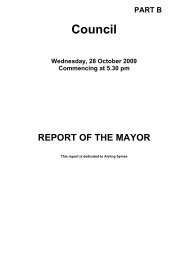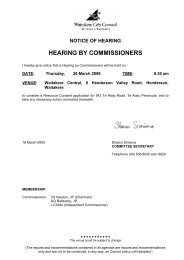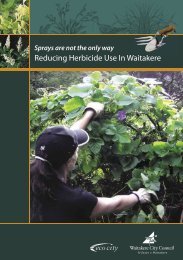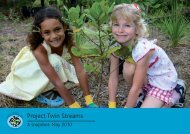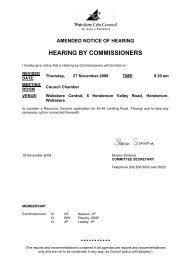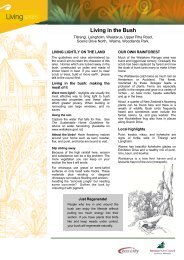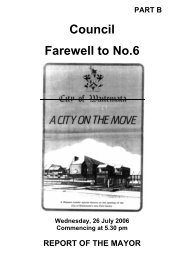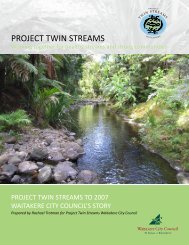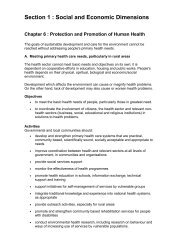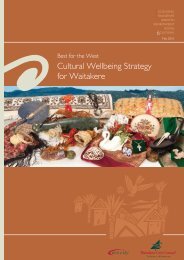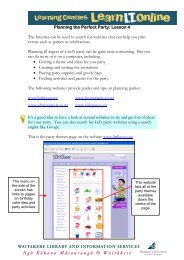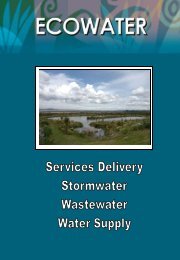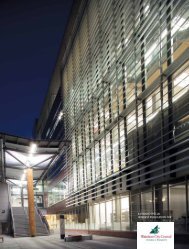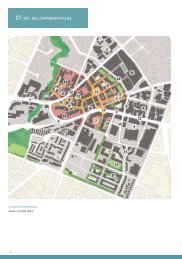The Waitakere Way - Looking Back, Going Forward - Auckland Council
The Waitakere Way - Looking Back, Going Forward - Auckland Council
The Waitakere Way - Looking Back, Going Forward - Auckland Council
Create successful ePaper yourself
Turn your PDF publications into a flip-book with our unique Google optimized e-Paper software.
PAGE 22Funding WADCOSS‘….the contract with the <strong>Council</strong> meant that we [WADCOSS] were able to become a viableand, I think, effective organisation, though from time to time we do apply elsewhere if we’rewanting extra things. It’s actually meant that we have sufficient money to employ staff at areasonable level…. the <strong>Council</strong> came to the party. <strong>The</strong>y took us to see the building that we’renow in. <strong>The</strong> Salvation Army were in it at the time. It was horrendous. It just looked awful. Itwas much darker than it is now. Little offices. Huge great big kitchen where they cooked up ameal they used to serve us – 80 to 100 people. It was just dreadful. Three <strong>Council</strong> Officersshowed us around. <strong>The</strong>y said, What do you think about it? I said, You’d only offer it to theCommunity. And they basically said, Well, it would scrub up well. And I said, Well if you thinkit’s a really good place to work, you vacate your offices and we’ll take them over from you. ButI have to say, once we decided that we’d give it a go.. <strong>The</strong> <strong>Council</strong> put about $20,000 in. <strong>The</strong>shared office space where the community groups are – there was actually a gap betweenthem and the rest of the building was just a bridge that went across. <strong>The</strong> <strong>Council</strong> did all of thatwork – sort of, joining it up properly and making the four offices, and then putting in the ramp.<strong>The</strong>n we set about getting sponsorship for the rest of it. <strong>The</strong>re were other nice things like.. Atthat time Waipareira Trust had a training, painting module going. All the trainees painted theplace’.‘With the Resource Centre, WADCOSS, one year the <strong>Council</strong> cut the money. If the thing haddied that year, you’d question what it was, really. <strong>The</strong>y didn’t cut it entirely. But they cut it, andthere was sort of word, ‘Oh, it’ll die.’ It didn’t die. It’s stronger than that’.A dog of a place‘You take that Centre – that Centre was a dog of a building – a really incredibly bad place.And some people – [..] might have been one of them - they had a go at <strong>Council</strong>. <strong>The</strong>y said,“How come someone else has these flash premises? And when it comes to the Community,we get this dog of a building.’Local Government’s RoleMy experience is that local bodies play a really key role, because they are in the middlebetween the individual and central government. I know that there are other bits and pieces inbetween,like the voluntary sector is a key mediating structure. But a local government thatdoes its job well has a really key role to play if it’s in touch with the community, particularly thestaff and politicians. If they’ve established good relationships with the community so that theycan tap in at regular points in time rather than when a problem arises, help us out. <strong>The</strong>y’rethere all the time. And the local body sits in that key position and it’s able to do some analysisof community issues, and not worry about the silos that Wellington has to worry about,because they see things through their own particular departmental eyes, whereas the localbody sees differently. So the local body plays a really important part.‘I don’t think it’s as simple as saying, “Through <strong>Waitakere</strong>’s history, you’ve had <strong>Council</strong>s thathave been really strong and effective with Community, and <strong>Council</strong>s that have been awful.” Ithink you can clearly see that some have been stronger on consultation than others. But interms of what’s being done physically, there’s a thread that goes right through them I thinksince ’89’.<strong>Council</strong>, planning, the communityI talked before about putting a blank sheet out, and saying ‘What do you want?’. When we didthe First Annual Plan process, the first three of them we did that. We had two consultations.<strong>The</strong> first one was ‘What do you want?’ <strong>The</strong> second one was ‘Here’. <strong>The</strong>n the second stagewas ‘Here is that Plan’. <strong>The</strong> third stage was ‘Do you want to comment on that Plan?’ We don’tdo that anymore, and I think that’s appropriate progression, because you get ‘consulted out’.But when it first happened, it was very important, culturally, to push that point: don’t just findout what people think about your ideas, find out what they think of all those things. So, comingback to First Call for Children, the same sort of issue arises. You can go out to the kids andsay, “What do you want?”. And they say, “Swimming, Skateboard, Bowls, activities in thePark” and so on. Or, you can go into the <strong>Council</strong> and say, “Well, what can you do?”



